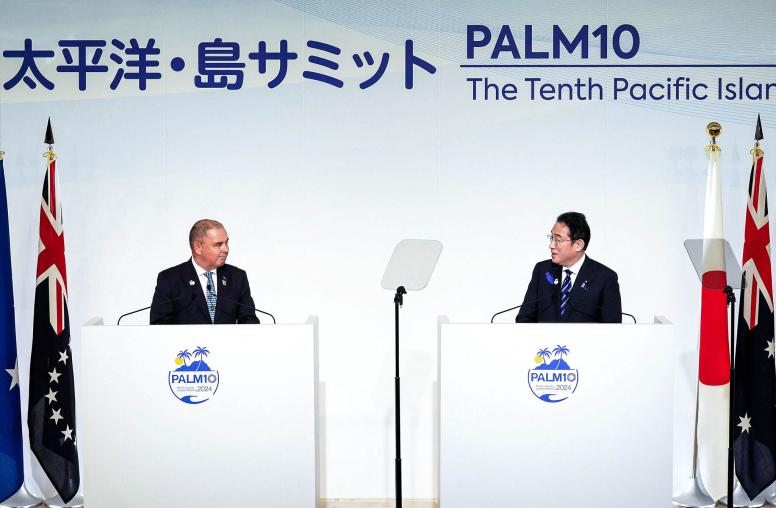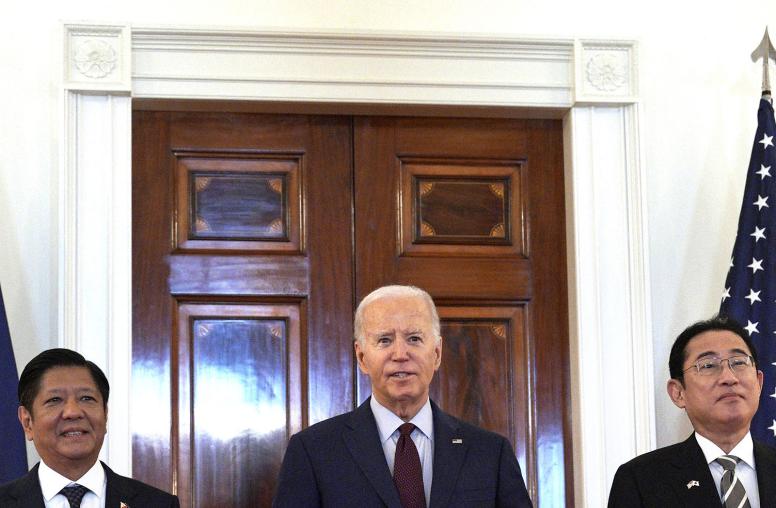Mirna Galic on Japan’s New National Security Strategy
President Biden will meet Friday with Japanese Prime Minister Fumio Kishida amid “a really high sense of insecurity” over North Korean missile tests, says USIP’s Mirna Galic. On the agenda: Japan’s new national security strategy, which features “potential for closer cooperation and integration of U.S. and Japan operations.”
U.S. Institute of Peace experts discuss the latest foreign policy issues from around the world in On Peace, a brief weekly collaboration with SiriusXM's POTUS Channel 124.
Transcript
Julie Mason: Mirna Galic is senior policy analyst for China and East Asia at the United States Institute of Peace. Here to discuss the Japanese prime minister's meeting with Biden at the White House on Friday. Hi, Mirna.
Mirna Galic: Hi, Julie. How's it going?
Julie Mason: Good. How are you doing?
Mirna Galic: Good. Thank you.
Julie Mason: So, this comes at an interesting time. Japan is getting militaristic again. They're building up their military. The world seems to be viewing that, not with alarm, just so much as just a notice.
Mirna Galic: Yes, certainly, Japan has announced some new features in its national security strategy that it released in December, including what they're calling, “counterstrike capability,” which refers to the ability to target missiles within an attacking country's territory and that's new. Militaristic is a bit of a loaded term, I think they are certainly amping up their defense, but there's a lot of details that go into that and it's a bit of a complicated analysis.
Julie Mason: So, what is the Japanese prime minister's agenda for this meeting?
Mirna Galic: So, I think, Japan is one of our most important allies and the White House emphasized this with the invitation of the former prime minister as the first foreign visitor to the White House in 2021. And now, it’s Prime Minister Kishida’s turn. But for Japan, this is part of a bigger set of visits. On the first of the year, Japan took over the presidency of the G7. And this week, Kishida is doing a number of visits to G7 countries starting with France today and capping it off with the U.S. on Friday.
Julie Mason: That's really interesting. For these meetings, there's usually an ask, there's usually something they want, that they seek, what is it for Japan right now?
Mirna Galic: So, again, I think, Prime Minister Kishida's focus is very strongly on the U.S.-Japan alliance and in addition to talking about preparations for the G7 summit in Hiroshima in May, he'll also be talking to President Biden about Japan's changes to its national security strategy and how they can work more closely with the U.S. to strengthen the alliance, given some of the changes that Japan has made and also some of the spending increases Japan is planning over the next five years. They're certainly planning to double their defense budget by 2027. So, that's a lot of news and a lot of potential for closer cooperation and integration of U.S. and Japanese operations in the region.
Julie Mason: How is the Japanese economy doing, Mirna?
Mirna Galic: Well, the economy is doing not super great, but I really can't speak to that very well, unfortunately, as I'm much more focused on the security side of things, which is always a bit easier. There's always something happening on that front.
Julie Mason: Of course, Japan has had some terrible scares from North Korea in the past year.
Mirna Galic: That's correct. Yes, the number of missiles that North Korea has fired in 2022, far exceeds that of any previous year. And certainly, that has fed into Japan's growing sense of insecurity. And that's part of why they have debuted this authority for counterstrike capability. They've always had the ability to do traditional missiles, well, not always, but for a long time, they’ve had the ability to do traditional missile defense, which means striking incoming missiles out of the sky, and they've also relied on the U.S. capability for first strike. But now they feel that this is not sufficient enough for their defense given the extreme uptick in North Korean missiles and also China's modernization and diversification of its missile arsenal as well.
Julie Mason: Well, I mean, for the Japanese people, it's one thing from a la distance, we kind of laugh at North Korea shooting all their missiles into the ocean and the futility of that, but for the Japanese people hearing air raid sirens, right, and knowing that missiles are flying over their country, that has got to be incredibly disturbing. There must be a lot of pressure on the public leaders there to do something.
Mirna Galic: Yes, indeed. And in fact, you know, counterstrike capability has been controversial in Japan historically. But there is now overwhelming popular support for the measure because of exactly what you've said. There's a really high sense of insecurity with Korea's missiles flying, or North Korea's missiles, flying regularly. I was actually in Japan in November for meetings, and I think there were like 10 missile launches in one day or something extreme while we were there, and it's just very disturbing for a regular member in the public.
Julie Mason: Right, and Mirna, when you're there, how do they alert the people that it's happening?
Mirna Galic: Well, there's news alerts that are happening, and I think, you know, missiles that aren't necessarily flying towards Japan's actual territory, but maybe landing in the waters outside are different than ones that are flying over Japan. So, there's different, obviously, measures for different types of missiles and then when I was there, I think there was a little bit of a less concern that they would be landing in Japan.
Julie Mason: How is the rest of the region dealing with Japan's new security ideas about itself?
Mirna Galic: Well, I think it's also important to remember that Japan may have announced new capabilities that it wants to have within the next five years, but Japan has continued to maintain its exclusively defense-oriented policy posture. So, that means that they can only respond to actual attacks on Japan, not even just the threat or potential attack, but actual attacks that have been initiated. And it's a bit complicated to understand this because it's hard to sometimes pinpoint when an attack has been initiated, especially if you're talking about missiles that have yet to be launched. But there are specific calculations Japan has to figure this out. And so, the announcement of counterstrike doesn't change this defense-oriented policy, it just adds a layer of measures that Japan can use in the service of this policy.
So, certainly Japan has been very clear that its efforts are very much focused on deterrence and that that's what its main priority is. So, in that sense, its posture hasn't changed really. You've had different reactions to this in the region. I think the Chinese and the North Koreans were very negative, of course, and have mentioned that they see this as Japan rearming, but the Japanese have definitely rejected that as not what their intention is. And I think the allies that they have in the region are much more understanding of the need to do this. And certainly, allies outside of the region, such as in the United States and Europe have welcomed these moves.
Julie Mason: And so, Prime Minister Kishida, how is he at home? Is he in good odour with the people?
Mirna Galic: There's been some controversies that his administration has faced, including with some religious organizations, the church of national unification, I think, has had some controversy and some officials in his administration have been caught up in that, so he's not necessarily in the best position. But you know, the G7 is a strong priority for Japan. So, I think that, you know, you'll certainly see him stay in office, at least until the meeting in May and whether or not he chooses to call elections after that, we'll see, but he has said that he can call some snap elections that are at an opportune time.
Julie Mason: Mirna Galic, senior policy analyst for China and East Asia at the United States Institute of Peace. Mirna, thank you for joining me.
Mirna Galic: Thanks, Julie.
Julie Mason: Have a great day.



